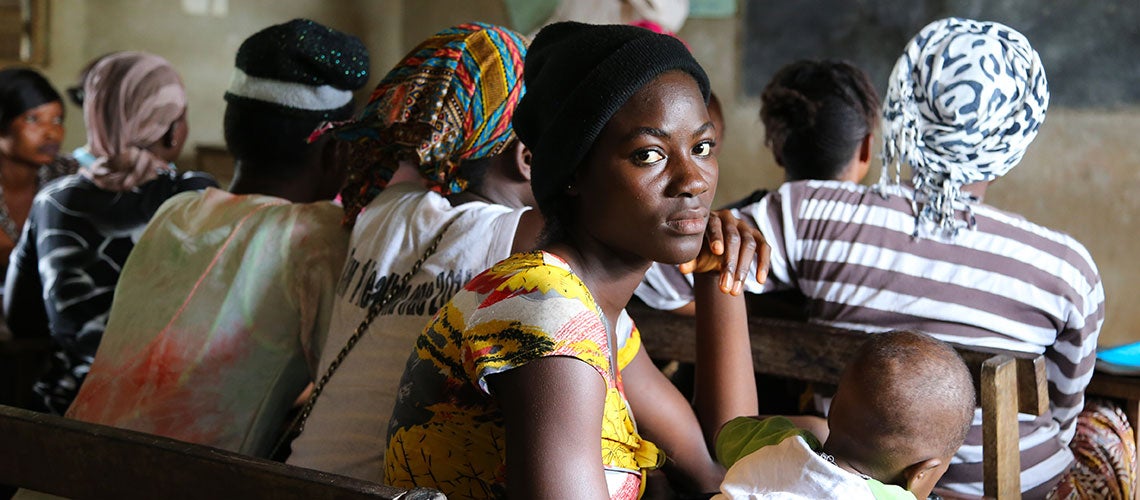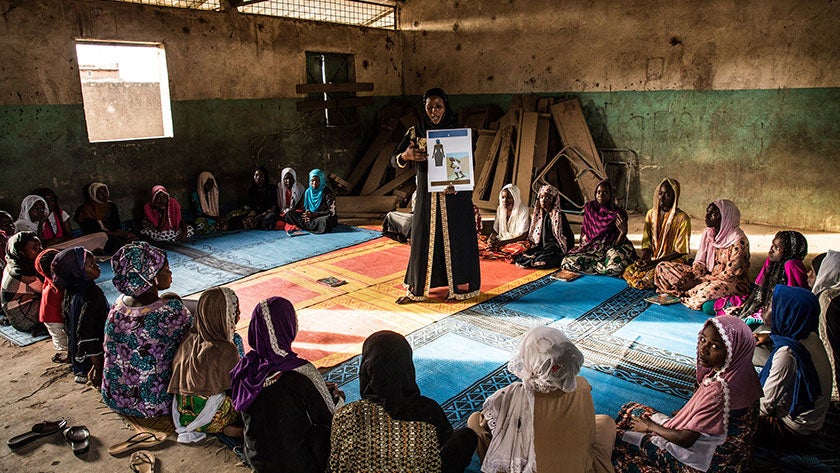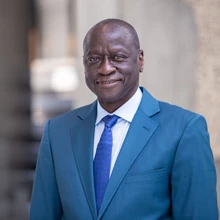 Class for young girls who fell pregnant during the Ebola crisis, in Sierra Leone. Photo: World Bank
Class for young girls who fell pregnant during the Ebola crisis, in Sierra Leone. Photo: World Bank
Each day, an estimated 137 women around the world are killed by a family member, and 52 of those killings take place in Africa. This is against a backdrop of 1 in 3 women worldwide experiencing physical or sexual violence in their lifetime. In the wake of the COVID-19 pandemic, this silent epidemic of violence against women and girls is expanding, and not getting nearly enough attention. I would like to reflect on what we have learned, and what we can do to step up our efforts in protecting and empowering our girls and women in West and Central Africa.
During the 2014 Ebola outbreak we witnessed an “epidemic” of “rape, sexual assault and violence against women and girls”. Many schools had to close, which worsened inequality, since girls were less likely to return to the classroom than boys. Many girls were forced to enter the job market or shoulder additional duties at home, leading to spikes in domestic violence and adolescent pregnancies. With the COVID-19 pandemic, a recent study from Save the Children warns that an additional 2.5 million girls worldwide are at risk of early marriage in the next five years.
The COVID-19 crisis continues to take a toll on African lives and economies, pushing up to 40 million people in Sub-Saharan Africa into extreme poverty. Women are bearing the brunt of this economic and social fallout. In fact, women are at higher risk of losing their source of livelihoods without any safety net to turn to since they work disproportionately in the informal sector and are excluded from social protection measures targeting workers.
Many of the frontline health workers and first responders are women, putting them at far greater risk of contracting COVID-19 transmission and falling ill. With schools and daycare closures, mothers must balance full time employment with childcare and schooling responsibilities while spending a disproportionate amount of time on unpaid domestic activities. Moreover, in time of social distancing and social isolation from their extended families and communities, women have fewer opportunities to escape abusive partners and reported cases of violence are rising.
This silent epidemic must stop. We need to ensure that no woman or girl is left behind as we build a resilient recovery post-COVID. So, what can we do? From our research and experience, we have identified three promising areas of focus:
Cash transfers have strong potential to reduce gender-based violence. Scaling up cash transfer programs can help reduce financial stress for poor families in times of crisis and thereby make women safer in their own homes. In Nigeria, the Household Uplifting program has provided cash transfers directly to poor female caregivers since 2016. With these cash payments, women can stand on their own feet and take care of their families. In Togo, a coronavirus cash transfer program – Novissi (which means ‘solidarity’ in the Ewe language) was introduced for those most impacted by the crisis, with a focus on women.
Safe spaces, mentoring and training can make a difference in the lives of adolescent girls. When there are fewer academic and economic opportunities teenage girls become more vulnerable. During the Ebola epidemic in Sierra Leone, girls in hard-hit areas were twice as likely to become pregnant than girls in less-affected communities. This increased the number of girls dropping out of school while also limiting their life trajectory in the long run. Many girls who are outside the protective school environment are increasingly vulnerable to early pregnancy and gender-based violence.
In several countries, we are now piloting adolescent girls’ programs to provide mentoring, support networks, and vocational and life skills training at a critical time in their lives. Evidence from an initiative implemented in Liberia shows that “safe spaces” or girls’ clubs combining life skills and livelihoods training effectively increased self-employment earnings and boosted self-confidence. In Sierra Leone, a safe space and skills-building intervention reduced rates of school dropouts and out-of-wedlock pregnancy following the Ebola crisis, which offers similar potential to prevent a wave of teen pregnancies and early marriages in the wake of COVID-19.
Implementing policies that work for girls and promote women’s equality is a critical step. Governments play a crucial role in lifting constraints to empowering adolescent girls and women. Many countries in the Sahel region are currently focusing on helping adolescents return to school and preventing gender-based violence. For instance in Benin, Burkina Faso, Cameroon, Chad, Côte d’Ivoire, Mali, Mauritania and Niger, the Sahel Women’s Empowerment and Demographic Dividend project (SWEDD) helps keep girls in school, expands economic opportunities for young women with a strong focus on prevention and improved response to risks of gender-based violence, notably through strong engagement of policymakers, civil society, parliamentarians, religious and traditional leaders.
Niger, which has the highest fertility rate in the world, has also adopted bold reforms in tackling child marriage and early childbearing. Legal reforms have been adopted to remove mandatory authorizations from parents or husbands of married adolescent girls to access family planning services. Married and pregnant girls, previously excluded from attending school, can now go back to school. Child Protection Committees have been institutionalized at the village level to protect girls from child marriage. Schools or ‘clubs for husbands’ are being established and involving traditional leaders and imams, to encourage husbands to discuss family life and family planning.
As an African proverb says: “Women are part of the origin of life’s big mystery on earth; they know the secret of a good life”. The secret of a better life is a future where we achieve gender equality and all our women and girls are empowered. While we continue fighting the multiple impacts of COVID-19, let’s not forget the silent pandemic of violence against women and girls. Giving voice and agency to women and girls, and ensuring their well-being, is the only way for societies to emerge stronger from this crisis. Together, let’s unite and join the call for global and country level actions to end violence against women!



Join the Conversation